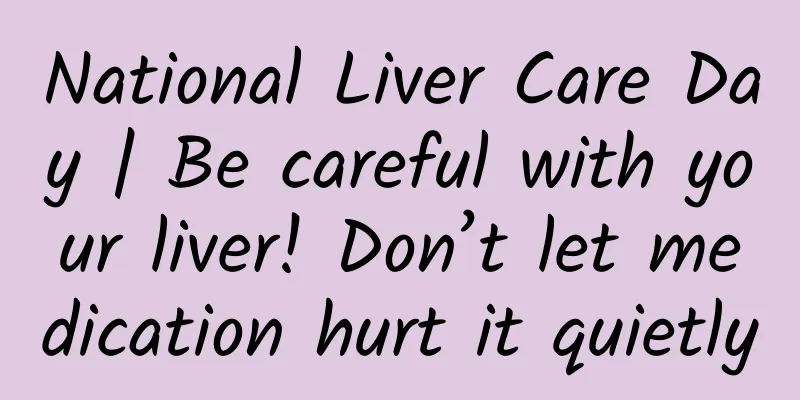National Liver Care Day | Be careful with your liver! Don’t let medication hurt it quietly

|
March 18 National Liver Care Day A report in 2018 said that Xiao Zhang, a 27-year-old graduate student in Nanjing, went to the pharmacy to buy several cold medicines because of a cold and fever, but the effect was not good after taking them. Not only did he continue to have a fever, but he also had diarrhea. After being sent to the hospital, he developed a high fever of 41°C, difficulty breathing, low blood pressure, renal failure, liver failure, severe coagulation dysfunction, etc. Despite active rescue, Xiao Zhang eventually failed to survive. It was only 7 days from admission to the hospital to his death! In 2020, there was a news report that a 26-year-old young man in Shenzhen had white hair early on. After hearing from a friend that Polygonum multiflorum had the effect of blackening hair, he took it for more than 20 days. Unexpectedly, he developed various physical discomforts and his skin color began to turn yellow. He was eventually diagnosed with drug-induced liver injury caused by Polygonum multiflorum. Drug-induced liver injury refers to liver injury induced by various prescription or over-the-counter chemical drugs, biological agents, traditional Chinese medicines, natural medicines, health products, dietary supplements and their metabolites and even excipients, also known as drug-induced liver disease. During the use of drugs, liver damage caused by the drug itself and/or its metabolites, or due to hypersensitivity or reduced tolerance to drugs due to special physical constitutions, is one of the most common and most serious adverse drug reactions. If not treated in time, it can cause acute liver failure or even death. A research paper titled "Incidence and Etiology of Drug-Induced Liver Injury in Mainland China" published in 2019 in Gastroenterology, a top journal in the field of digestive diseases, shows that the annual incidence of drug-induced liver injury in the general population in my country is at least 23.80 per 100,000 people, which is higher than that in Europe and the United States. In recent years, the number of diagnosed cases of acute drug-induced liver injury in my country has increased year by year, and it has become a serious public health issue that cannot be ignored. So, how should we view drug-induced liver injury and how can we prevent and avoid it? Which common western medicines can cause liver damage? 1 Nonsteroidal anti-inflammatory drugs Including sodium para-aminosalicylate, acetaminophen, ibuprofen, indomethacin, hydroxychloroquine, aspirin, etc. According to the "Guidelines for the Diagnosis and Treatment of Drug-Induced Liver Injury (2019)", acetaminophen is the main cause of acute liver failure, and many cold medicines contain this ingredient. The first case at the beginning of the article is acute liver and kidney failure caused by overdose of cold medicine. 2 Anti-infective drugs Among the anti-infective drugs, anti-tuberculosis drugs, such as rifampicin, isoniazid, ethambutol, etc., are the most serious cause of liver damage. Other common ones include macrolides (erythromycin, clarithromycin, etc.), penicillins (amoxicillin, etc.), cephalosporins, levofloxacin, etc., which are used to treat bacterial infections. The liver damage caused by these drugs is not related to the drug dosage and treatment course, and often occurs in patients with allergies or metabolic abnormalities. Therefore, patients with a history of drug allergies must pay special attention. 3 Cardiovascular system medications Such as lipid-lowering drugs such as rosuvastatin and atorvastatin, antihypertensive drugs such as nifedipine, metoprolol, and labetalol, and antiarrhythmic drugs such as amiodarone and mexiletine. For patients using such drugs, it is recommended to have a liver function test every 3 months after the first use. In addition, anti-tumor drugs, central nervous system drugs, metabolic disease drugs, hormone drugs, certain biological agents, etc. can also cause drug-induced liver injury. The picture is hand-painted by the author These misunderstandings must be recognized Myth 1: Only Western medicine can cause drug-induced liver injury Many people believe that only Western medicine has side effects. Before taking the medicine, they see the dense information about adverse reactions, precautions, etc. on the instructions. In addition, doctors and pharmacists remind them to pay attention to adverse reactions and regularly monitor liver and kidney function, which makes them inevitably worry about the safety of Western medicine. Traditional Chinese medicine and health products are different. Most of the instructions only have the words "not yet clear", so many people believe that Chinese medicine has little toxic side effects. Some ordinary people are especially keen on using folk remedies, local remedies, and plant extracts, thinking that these are pure natural, pollution-free, non-toxic and very safe. The picture is hand-painted by the author But the reality is that food, health products, traditional Chinese medicine, and Chinese patent medicine may cause drug-induced liver damage and have toxic side effects on the liver. At present, the most reported cases in my country include: Polygonum multiflorum, the plant Panax notoginseng containing pyrrolizidine alkaloids, and some Chinese and Western medicine compound preparations for the treatment of osteoporosis, arthritis, vitiligo, psoriasis, eczema and other diseases. Especially the Polygonum multiflorum mentioned in the second example at the beginning of the article. In 2014, the former State Food and Drug Administration issued a warning to "pay attention to the risk of liver damage from oral Polygonum multiflorum". Processed Polygonum multiflorum, that is, cooked Polygonum multiflorum, has the effects of nourishing the liver and kidneys, improving blood and essence, and blackening hair. Raw Polygonum multiflorum has the effects of detoxification and laxative, but it contains an anthraquinone derivative, which has certain liver toxicity and stimulates intestinal congestion. Therefore, everyone must be vigilant. Before using Polygonum multiflorum and its formula preparations, be sure to read the drug instructions carefully, take it strictly according to the usage and dosage, or use it under the guidance of a doctor to avoid long-term use. Myth 2: The consequences of drug-induced liver injury are not serious Some people will say, "I know that taking medicine can cause some side effects, such as gastrointestinal discomfort and skin rashes. If these side effects occur, stop taking the medicine in time and there should be no problem." Some people will also say that the toxic side effects of some Chinese medicines and supplements are small, and even if you are unlucky and your liver is damaged, you can stop taking the medicine and take some liver-protecting medicine, and it should be no big deal." This concept is very risky. Liver damage is different from gastrointestinal reactions. Gastrointestinal adverse reactions are easy to detect in time, but liver damage is not easy to detect early. In the early stage, the body may not feel anything, often just poor spirits, lack of strength, poor appetite and other non-specific manifestations. Patients often mistakenly think that it is work fatigue and do not pay attention to it. When the urine color becomes obviously darker, or even the gums bleed obviously, they will find something wrong. At this time, the liver damage is already very serious. The picture is hand-painted by the author Drug-induced liver injury can be divided into acute (within 6 months) and chronic (over 6 months) according to the course of the disease. Acute drug-induced liver injury can cause acute or subacute liver failure, complicated by hepatic coma and death, with a mortality rate of up to 90%. Chronic drug-induced liver injury is clinically manifested as chronic hepatitis, liver fibrosis, etc., and a small number of patients may also develop liver tumors. Therefore, everyone must not take it lightly and must pay extra attention to it. How to prevent drug-induced liver injury? 1. Try to avoid taking drugs that can damage the liver. If necessary, follow the instructions or the treatment plan of the doctor or pharmacist, use it according to the correct usage, dosage and course of treatment, and have regular checkups at the frequency prescribed by the doctor. If it is an over-the-counter drug, be sure to take it according to the instructions or under the guidance of the pharmacist at the pharmacy. Do not use it at will, do not change the plan at will, and avoid large doses, frequent use or mixing multiple drugs. 2. Pay attention to the early manifestations of liver damage, early detection and early treatment. Due to individual differences, the time it takes for drugs to cause liver damage varies. Some people may develop acute liver damage immediately, while others may develop delayed liver damage one week after stopping the drug. Therefore, during medication, you should pay attention to monitoring liver function and observe whether there are symptoms such as nausea, vomiting, loss of appetite, yellow urine and body, fever and fatigue. If the above symptoms occur after taking the medicine, you must seek medical attention in time. 3. Avoid taking medicine on an empty stomach, avoid taking medicine in a state of long-term malnutrition, and avoid taking medicine after drinking or drinking. 4. Pay attention to your living habits, eat regularly, don’t stay up late, and don’t drink alcohol! Only by using medication scientifically and regularly can you protect your liver! Be sure to - be careful, darling! Author: Mi Pengbo, Chief Pharmacist of Heilongjiang Provincial Third Hospital Review expert: Wang Baoxin, deputy director and pharmacist of the Pharmacy Department of Peking University First Hospital Liu Guiyang, Chief Pharmacist of the Pharmacy and Pharmacology Department of the Fourth Medical Center of the PLA General Hospital |
<<: Food safety is our shared responsibility
Recommend
What should I do if I have low blood pressure and feel dizzy during pregnancy?
Once a woman becomes pregnant, many changes will ...
If you don't vomit during pregnancy, you are stupid
Vomiting is the most common reaction during pregn...
Hypertension, the public enemy of human health
Author: Du Yanmei Beijing Hui Hospital Reviewer: ...
What kind of tea is suitable for women?
Drinking tea at work and in life has the effect o...
Can sagging breasts during pregnancy be restored?
Whether during pregnancy or breastfeeding, pregna...
Can I do Pilates while I am menstruating?
Many women are too fat, so in this case, many peo...
Optim.al: From April 2009 to December 2011, Facebook added an average of 600,000 new users per day, 7 new users per second
According to data from Optim.al, Facebook's a...
How to treat sagging breasts after childbirth
Sagging breasts after giving birth is a major con...
How to fix leather jackets that become hard after washing?
Leather jackets are a common item in life. They a...
Can I eat fatty and lean pork during menstruation?
Menstruation refers to the menstrual period of wo...
What are the reasons for miscarriage during pregnancy?
It is very easy to have miscarriage at the beginn...
Lactation meridian diagram
New mothers are usually anxious because their bre...
Can I drink Roselle during menstruation?
Hibiscus tea may be more familiar to female frien...
How to regulate a woman's poor physical condition
Poor physical condition is believed to be a probl...









